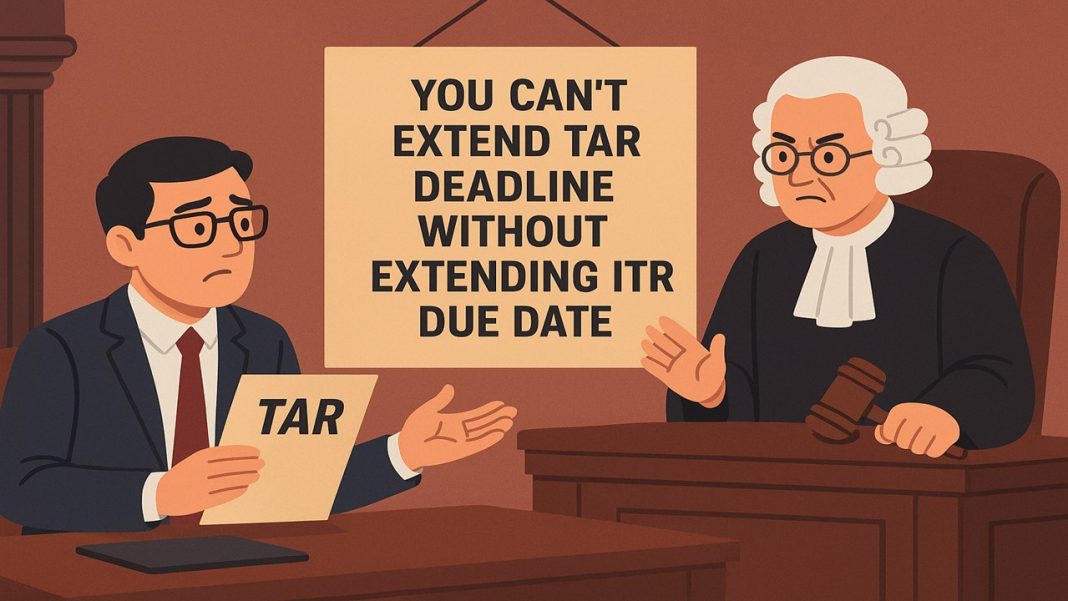“You Can’t Extend TAR Deadline Without Extending ITR Due Date,” Gujarat HC Says to CBDT
The Gujarat High Court has asked the government to explain why it did not extend the due date for Income Tax Return (ITR) filing to November 30, 2025, after already extending the Tax Audit Report (TAR) filing due date to October 31, 2025, since both are legally linked under the Income Tax Act. The High Court has recently issued an important official judgement concerning the powers of the Central Board of Direct Taxes (CBDT) regarding the extension of due dates under the Income-tax Act, 1961, particularly focusing on Section 44AB (filing of tax audit report-TAR) and Section 139(1) (filing of return of income-ITR).
The Income Tax Bar Association and another (petitioners) have filed these present writ petitions under Article 226 of the Constitution of India against the Union of India and Others (respondents), requesting the High Court to direct the tax department to further extend the due date for filing the Tax Audit Report (TAR) under Section 44AB of the Income Tax Act, 1961. Additionally, requested a corresponding extension of the deadline for filing Income Tax Returns (ITR) under Section 139(1) of the Act.
Under the Income Tax Act, the due date for filing the audit report should be at least one month before the due date of filing the Income Tax Return (ITR). Hence, both dates are closely interconnected. The bench comprised Justice Bhargav D. Karia and Justice Pranav Trivedi.
The writ petition is still pending the final decision. The Central Board of Direct Taxes (CBDT) issued Circular No. 14/2025 dated 25.09.2025, which extended the “specified date” for submitting audit reports for FY 2024–25 (AY 2025-26) from September 30, 2025, to October 31, 2025.
This circular was produced before the court through a draft amendment in the main petition, and the court allowed that amendment immediately.
Since the main request for a TAR deadline extension has already been granted through the CBDT circular, the complaint regarding the TAR deadline has been resolved.
The Gujarat High Court has ruled that the Central Board of Direct Taxes (CBDT) has no power to make amendments to the rules of Section 44AB of the Income Tax Act. Under the Income Tax Act, Section 44AB requires certain taxpayers (like businesses/professionals with turnover/income above a threshold) to get their accounts audited and submit an audit report. Hence, they are required to file a Tax Audit Report (TAR).
The “specified date” to submit the audit report is linked to the “due date” under Section 139(1), which is the section dealing with the filing of income tax returns (ITR). Now, the “due date” for submitting the audit report is essentially considered to be one month before the ITR filing due date (in most cases).
On August 20, 2014, a notification was issued by CBDT to extend the due date for filing a Tax Audit Report (TAR) under Section 44AB. However, a simultaneous extension was not done to the Income Tax Return (ITR) deadline under Section 139(1).
According to the law, if the audit report deadline (specified date) is extended to October 31, 2015, then the ITR filing deadline should automatically be extended to November 30, 2025, under Section 139(1) because the specified date is defined as one month before the due date.
This led to confusion and practical difficulties, as the tax audit is required before filing the return. So, extending the audit deadline without extending the return deadline does not help taxpayers much; it is like giving more time to prepare a document but not more time to use that document where it’s needed.
When the Gujarat High Court observed this issue, it noted the following points:
The Central Board of Direct Taxes (CBDT) has no statutory powers to relax the provisions or make changes in the provisions of Section 44AB on its own. It is not allowed to change or delay what the law has strictly specified, unless supported by the law.
However, the term “due date” mentioned in Section 44AB is tied to the due date under Section 139(1), meaning if the ITR due date is extended, then the audit report due date automatically extends too.
Therefore, the Court said, if the CBDT has extended the audit report deadline by notification, it should have simultaneously issued a notification extending the due date for filing the Income Tax Return (ITR) under Section 139(1). That would make the extension legally valid and effective.
The Court implied that even without an explicit order, when the audit date is extended, the ITR due date is “deemed to have been extended,” that is, it should be automatically considered extended by one month.
The High Court has now directed the CBDT to explain why it did not issue a simultaneous notification to extend the ITR filing deadline when it extended the tax audit deadline.
The issue notice is returnable on October 06, 2025, and the matter should be listed as a top priority.
Citation: Income Tax Bar Association and Anr. Vs Union of India and Ors. (Gujarat High Court); R/Special Civil Application No. 13533 of 2025; 26/09/2025; 2025-26



